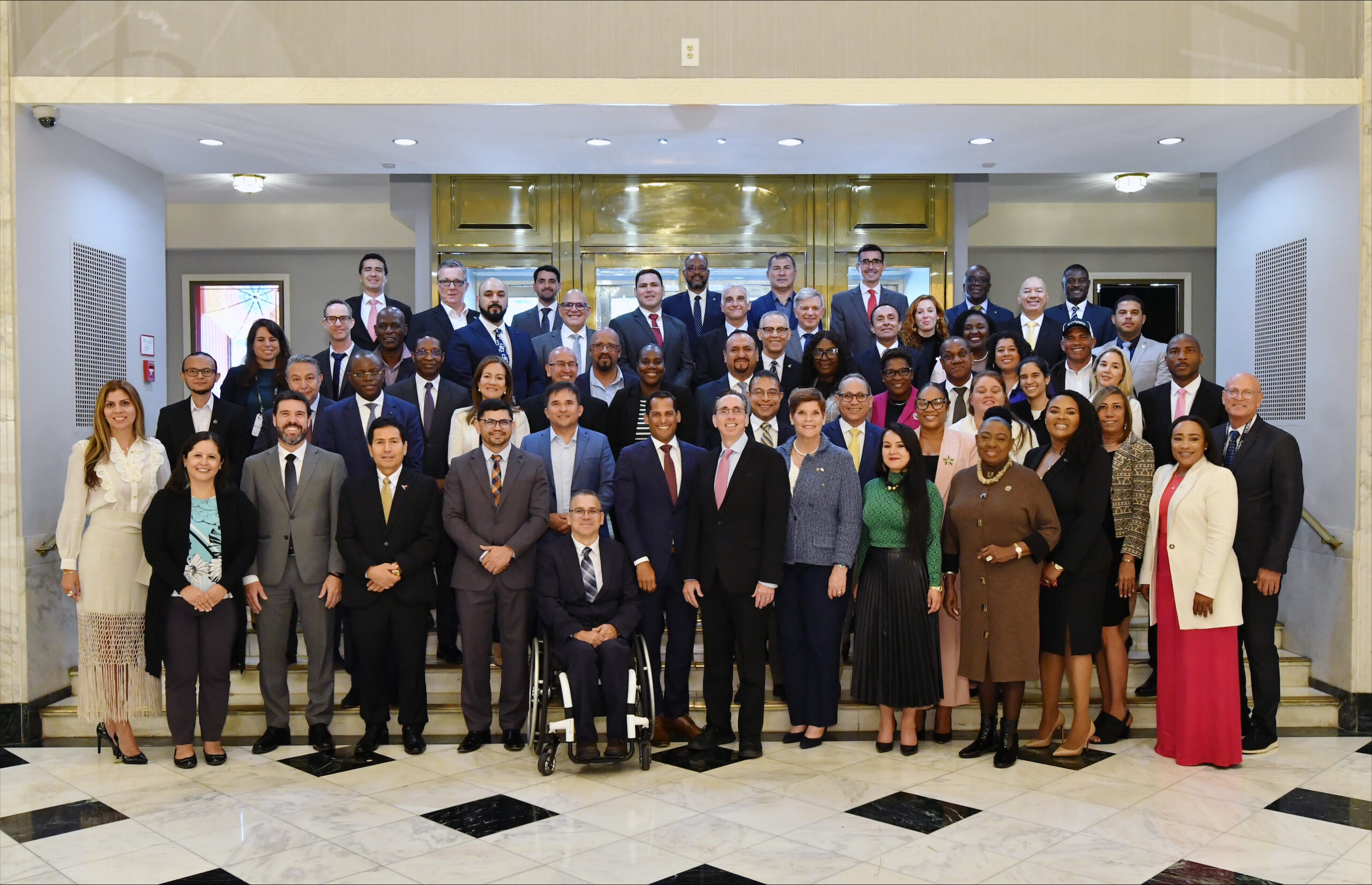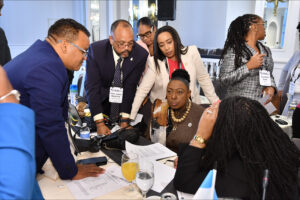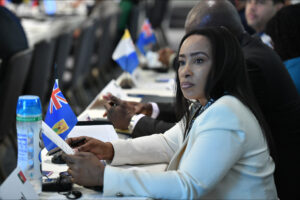Caribbean News
Minister of Education, Youth, Sports, and Culture signs sport declarations at General Assembly American Sports Council – CADE 2024
Published
2 years agoon
By
Shanieka
Press Release
Washington, USA, April 26, 2024 – Hon. Rachel Taylor, Minister of Education, Youth, Sports, and Culture, signs CADE declarations at the General Assembly American Sports Council, CADE 2024 held in Washington DC, USA.
The Sport meetings commenced on Thursday, 25th April and continued through Friday, 26th April, 2024. There were three meetings held during the two days: A bi-lateral meeting hosted by the USA for English Speaking Caribbean countries; CONCECADE (Meeting for Central America, Mexico, and the Caribbean); and CADE (meeting with South America, Central America, and the Caribbean and North America).
Accompanying the Minister were the Deputy Permanent Secretary of Education, Youth, Sports and Culture, Mr. Amin McCartney, and the Director/CEO of the TCI Sports Commission, Mr. Jarrett Forbes. Sport leaders from thirty (30) plus countries from across South America, Central America, North America, and the Caribbean were present.
Amongst the topics discussed were: a report from the recently hosted Pan-American and Parapan-American Games in Santiago Chile 2023 and its legacies; Jamaica’s approach to developing mass participation through its Sport for All programmes; USA Commission for Athlete Representation; Inclusion in sports through strengthening para and special Olympic programmes; the commitment and social benefits of physical activity in schools; Structure and application of the Paralympic sport system in Columbia; and anti-doping in sports.
After the General Assembly, common positions for the future of sports in the Americas were taken with a final declaration and bilateral agreements of the CADE Assembly 2024.
Comment from the Minister of Education Youth Sports Culture and Library Services
“It was a pleasure to attend the General Assembly of the American Sports Council – CADE 2024 for the first time as the Minister of Sports for the TCI. It provided a greater insight into the roles and responsibilities of each entity and the kind of support we can garner whether financially, technically, or in the area of training. The CONCECADE bi-lateral meeting with Mexico, Central America, and the Caribbean provided an opportunity for Caribbean Member countries to voice their concerns in relation to legacy matters including the dissemination of minutes and other content in English. This year yielded the largest number of Caribbean Ministers in attendance for the English-speaking countries, providing an opportunity to share best practices and collaborate with their counterparts.”
CADE Declarations signed by the Minister of Education, Youth, Sports and Culture include:
First: Sports is something very special – it brings people together from every corner of the world, from every possible background. Each person, from every age, should have the opportunity to participate in the sports they enjoy. It is essential that all of us throughout the Americas reiterate our longstanding commitment to the development and implementation of sports policies for every segment of society, without any discrimination of any kind. It is essential to recognize that sports also have a critical role to play in addressing many of our social issues, including gender equality and inclusion, health promotion, education, and livelihood.
Second: Paralympians are amazing athletes and an inspiration to everyone who gets the chance to see what they can do. It is essential for every country to ensure that Paralympic athletes have robust opportunities to train, compete, and celebrate their amazing and vital contribution to sports.
Third: The Americas is proud of the success of the 2023 Pan American Games hosted by the Government of Chile and organized in cooperation with Pan Am Sports and the Chilean National Olympic Committee. We offer our deepest congratulations to all athletes who competed, their coaches and families, and to all those in Chile who worked so hard to ensure the success of the Games.
Fourth: The success of sports in the Americas has many elements, but first among them is the commitment to excellence of our athletes. The dedication, discipline, and spirit of everyone who seeks to be the best in their fields is an inspiration to us all, especially our children, who need role models and heroes to look to as they pursue their dreams.
Fifth: The Members of CADE commit to strengthening CADE as an organization with the vision of it building on the strong foundation that already exists, to becoming an even more robust hemispheric multilateral organization specializing in Sports.
Sixth: All CADE member countries are signatories to the UNESCO convention and we reiterate the importance of the convention as a government multilateral institution with critical anti-doping responsibilities and an obligation to work collaboratively with all sports and anti-doping stakeholders.
Seventh: Anti-Doping is a critical responsibility for every country. In this regard, it is vital that public authorities, whether through their Sports Ministry or otherwise, ensure that sufficient funding is available to national anti-doping organizations so that they are able to effectively implement their important obligations to ensure fair competition. It is the responsibility of the government to support the institutions our athletes are part of, to ensure the integrity of sports. The CADE general assembly very much appreciated the opportunity to hear directly from the WADA President for the first time.
Eight: The Olympic Movement plays a very critical role in the World of Sports. They are a vital stakeholder year-round, not just when it’s time for the Summer and Winter Olympics to develop Sports. They are part of the Sports ecosystem, which includes sports ministries, the International Olympic Committee, Pan Am Sports, the National Olympic Committee, Sports Federations National Anti-Doping Organizations, and a wide array of support and sponsors. It is critical that these vital relationships among all stakeholders remain strong. We thank the International Olympic Committee for their participation in this year’s CADE Sports Summit and invite them to participate again next year.
END
You may like
-


TCI Boat Club Donates $7,000 to TCI SNAP Centre from 11th Annual Poker Run
-


100k cash grant distribution schedules to be released in a week
-


Important Update on Garbage Collection Services in Providenciales
-


New Tractor for Abaco Farmers Announced at Ministry of Agriculture Town Hall Meeting
-


BIRTH CERTIFICATE IN BRAILLE
-


Turks and Caicos Retains Championship at 28th Annual Caribbean Classic Golf Tournament
Caribbean News
Seven Days. Seven Nations. One Storm — Hurricane Melissa
Published
2 weeks agoon
November 1, 2025
A week of wind, water, and heartbreak
From Haiti’s hillsides to Bermuda’s reefs, seven Caribbean nations have been battered, bruised, and forever marked by Hurricane Melissa — a storm that tested not only the region’s infrastructure but its unshakable spirit of unity.
Saturday–Sunday, October 25–26 – The First Strike: Hispaniola
Before the storm even earned its name, torrential rain and flash floods swept across Haiti and the Dominican Republic, claiming lives and tearing through rural communities.
tearing through rural communities.
In southern Haiti, rivers burst their banks, swallowing roads and homes; 23 people were confirmed dead by Sunday evening. Across the border, one death was reported in the Dominican Republic as swollen rivers cut off villages in Barahona and Pedernales.
By nightfall, the tropical system had strengthened — and the Caribbean knew it was facing something historic.
Monday, October 27 – Evacuations and Airlifts
In The Bahamas, Prime Minister Philip Davis issued a mandatory evacuation for the MICAL Islands — Mayaguana, Inagua, Crooked Island, Acklins, Long Cay, and Ragged Island.
Bahamasair added extra flights as the nation braced for what forecasters warned could become the strongest storm in nearly two decades.
Meanwhile, Jamaica, Turks & Caicos, and Cuba activated their national emergency operations centers.
Tuesday, October 28 – Jamaica and Haiti Hit Hard
By afternoon, Hurricane Melissa made landfall near St Elizabeth, Jamaica, as a Category 5 hurricane — winds of 185 mph, central pressure 892 mb, the lowest ever recorded so close to the island.
Roads collapsed, bridges washed away, and Black River Hospital lost its roof. Power failed for 72 percent of the island.
BOJ TV footage shows split asphalt, sparking lines, and flooded communities abandoned for safety.
Initially four were reported dead, that grew to seven deaths and heavy damage in 170 communities; Andrew Holness, Jamaican Prime Minister calling it “a national test of resilience.”
Haiti, still recovering from the weekend’s flooding, was hit again as outer bands dumped more rain on Les Cayes and Jacmel, deepening the humanitarian crisis.
Wednesday, October 29 – Crossing to Cuba
Weakened slightly to Category 4 (145 mph), Melissa tracked north-northeast at 8 mph, hammering eastern Cuba with hurricane-force winds
and mudslides. Over 15 000 people were evacuated from Santiago de Cuba and Holguín.
In Turks & Caicos, the Regiment deployed to Grand Turk, Salt Cay, South, North and Middle Caicos, preparing shelters and securing public buildings.
Thursday, October 30 – The Bahamas and the All Clear
Melissa’s speed increased, sparing the northern Caribbean its worst.
The Bahamas Airport Authority closed 13 airports from Mayaguana to Exuma International; none reported casualties, though infrastructure suffered.
In Turks & Caicos, the all-clear came early Thursday after minimal impact. Premier Washington Misick expressed gratitude and pledged support for neighbors:
“We must act — not only with words, but with compassion and deeds.”
Friday, October 31 – Counting the Cost
By Friday, Melissa had weakened to Category 3 (120 mph) north of Cuba.
The Bahamas Department of Meteorology issued its final alert, lifting warnings for the southern islands.
Regional toll:
- Haiti: 23 dead, thousands displaced.
- Jamaica: 7 dead, 170 communities damaged; 72% without electricity
- Cuba: 2 dead, 15, 000 evacuated.
- Dominican Republic: 1 dead, flooding in southwest.
- Bahamas: 0 dead, minor infrastructure damage and flooding in southeast.
- Turks & Caicos: minimal to no impact.
Relief and Reconnection
The Cayman Islands became the first government to touch down in Jamaica post-storm. Premier Juliana O’Connor-Connolly led a contingent bringing a plane-load of essentials and pledged US $1.2 million in aid.
Reggae icon Shaggy arrived on a private jet with friends, delivering food, medical kits, and hygiene supplies.
Meanwhile, Starlink and FLOW Jamaica activated emergency satellite internet across Jamaica providing free connectivity through November.
From overseas, U.S. President Donald Trump, speaking during his Asia tour, announced that American search-and-rescue teams and disaster aid will support the region.
“They can depend on U.S. assistance as they recover from this historic storm,” he said.
Faith, Funds, and False Websites
The Government of Jamaica and the Sandals Foundation have both launched verified donation portals for recovery. Officials are warning against fake crowdfunding pages posing as relief sites and urging donors to use only official channels.
A Seventh Nation in the Crosshairs – Bermuda
As Hurricane Melissa left the Caribbean basin, Bermuda found itself next in line.
Forecasts indicated the storm would pass just west of the island late Thursday into Friday, likely as a Category 1 to 2 hurricane with sustained winds near 105 mph.
Though far weaker than when it ravaged Jamaica, officials issued a hurricane warning, urging residents to secure property and expect tropical-storm conditions.
By all appearances Bermuda is heeding the warnings
The Human Response
Across the Caribbean, solidarity surged.
The Global Empowerment Mission (GEM) in Miami began airlifting relief supplies, while churches, civic groups, and businesses in The Bahamas and Turks & Caicos organized drives for displaced families.
“Your dedication gave our islands the strength to face the storm,” Premier Misick said. “Together, as one Caribbean family, we will rise stronger.”
Resilience in the Wake
Melissa’s winds may have faded, but her impact endures. Engineers are inspecting bridges, hillsides, and water systems; volunteers are clearing debris and distributing aid in communities still cut off.
From Haiti’s ravaged river valleys to Jamaica’s sugar towns, from Cuba’s eastern hills to The Bahamas’ salt ponds and Bermuda’s reefs, the region once again stands at the crossroads of ruin and renewal — and leans, as always, toward hope and a faithful God
Caribbean News
Haitian Pushback Halts Controversial Constitution Rewrite — What’s Next?
Published
1 month agoon
October 15, 2025
Deandrea Hamilton | Editor
Haitian media, legal scholars and civic voices did what bullets and barricades couldn’t: they stopped a sweeping constitutional overhaul widely branded as anti-democratic. Editorials and analyses tore into proposals to abolish the Senate, scrap the prime minister, shift to one-round presidential elections, expand presidential power, and open high office to dual-nationals—a package critics said would hard-wire dominance into the executive at a moment of near-lawless insecurity.
The Venice Commission—Europe’s top constitutional advisory body—didn’t mince words either. In a formal opinion requested by Haiti’s provisional electoral authorities, it pressed for clear legal safeguards and credible conditions before any referendum, including measures to prevent gang interference in the electoral process—an implicit rebuke of pushing a foundational rewrite amid a security collapse.
Facing that drumbeat, Haiti’s Transitional Presidential Council has now formally ended the constitutional-reform initiative. The decision, taken at a Council of Ministers meeting at the National Palace, effectively aborts the rewrite track that has haunted Haiti since the Moïse and Henry eras.
So what now? Per the Miami Herald, the pivot is back to basics: security first, elections next. That means stabilizing Port-au-Prince enough to run a vote, rebuilding the electoral timetable, and empowering the provisional electoral machinery—none of which is simple when gangs control vast chunks of the capital and state authority remains fragile. Recent headlines underline the risk: gunfire has disrupted top-level government meetings, a visceral reminder that constitutional theory means little without territorial control.
Bottom line: Haitian journalists and public intellectuals helped slam the brakes on a high-stakes centralization of power that lacked legitimacy and safe conditions. International constitutional experts added weight, and the transition authorities finally conceded reality. Now the fight shifts to making an election possible—clean rolls, secure polling, and credible oversight—under circumstances that are still hostile to democracy. If the state can’t guarantee basic safety, any ballot is theater. If it can, shelving the rewrite may prove the first real step back toward consent of the governed.
Caribbean News
Political Theatre? Caribbean Parliamentarians Walk Out on House Speaker
Published
1 month agoon
October 14, 2025
By Deandrea Hamilton | Magnetic Media
October 14, 2025 – It’s being called political theatre — but for citizens, constitutional watchdogs, and democracy advocates across the Caribbean, it feels far more serious. Within a single week, two national parliaments — in Trinidad and Tobago and St. Kitts and Nevis — descended into turmoil as opposition members stormed out in protest, accusing their Speakers of bias, overreach, and abuse of parliamentary procedure.
For observers, the walkouts signal a deeper problem: erosion of trust in the very institutions meant to safeguard democracy. When Speakers are viewed as political enforcers instead of neutral referees, parliaments stop functioning as chambers of debate and start performing as stages for power and spectacle — with citizens left wondering who, if anyone, is still accountable.
October 6: St. Kitts Parliament Erupts
The first walkout erupted in Basseterre on October 6, 2025, when Dr. Timothy Harris, former Prime Minister and now Opposition Leader, led his team out of the St. Kitts and Nevis National Assembly in a protest that stunned the chamber.
led his team out of the St. Kitts and Nevis National Assembly in a protest that stunned the chamber.
The flashpoint came as the Speaker moved to approve more than three years’ worth of unratified parliamentary minutes in one sitting — covering 27 meetings and three national budgets — without individual review or debate.
Dr. Harris called the move “a flagrant breach of the Constitution and parliamentary tradition,” warning that the practice undermines transparency and accountability. “No serious parliament can go years without approving a single set of minutes,” he said after exiting the chamber.
The Speaker defended the decision as administrative housekeeping, but critics were unconvinced, branding the move a “world record disgrace.” The opposition’s walkout triggered renewed calls for the Speaker’s resignation and sparked a wider public discussion about record-keeping, accountability, and respect for parliamentary norms in St. Kitts and Nevis.
October 10: Trinidad Opposition Follows Suit
Four days later, on October 10, 2025, the Opposition United National Congress (UNC) in Trinidad and Tobago staged its own walkout from the House of Representatives in Port of Spain.
The UNC accused the Speaker of partisan bias, claiming she had repeatedly blocked urgent questions, ignored points of order, and allowed government members to breach standing orders without consequence.
“The Speaker has failed in her duty to act impartially,” the Opposition declared in a statement. “Parliament is not the property of any political party or Presiding Officer.”
The dramatic exit was seen as a culmination of months of rising tension and frustration, with opposition MPs arguing that parliamentary rules were being selectively applied to silence dissenting voices.
Political analyst Dr. Marcia Ferdinand described the twin walkouts as “a warning sign that parliamentary democracy in the Caribbean is teetering on the edge of performative politics.”
“When chairs become political shields rather than constitutional referees,” she said, “democracy becomes theatre, not governance.”
A Pattern Emerging
While St. Kitts and Trinidad are very different political environments, both incidents point to the same regional fault line: the perception that Speakers — the guardians of parliamentary order — are no longer impartial.
In Westminster-style systems like those across the Caribbean, the Speaker’s authority depends not on power but on public confidence in fairness. Once that credibility erodes, parliamentary control collapses into confrontation.
Governance experts say the implications are serious: eroded trust between government and opposition, declining public confidence in state institutions, and growing voter cynicism that “rules” are flexible tools of political advantage.
Why It Matters
Parliamentary walkouts are not new in the Caribbean, but what makes these recent events different is their frequency and intensity — and the regional echo they’ve created. Social media has amplified images of lawmakers storming out, with citizens from Barbados to Belize questioning whether the same erosion of decorum could be happening in their own legislatures.
the regional echo they’ve created. Social media has amplified images of lawmakers storming out, with citizens from Barbados to Belize questioning whether the same erosion of decorum could be happening in their own legislatures.
Analysts warn that if this perception takes hold, it risks diminishing the moral authority of parliamentary democracy itself.
“Once opposition MPs believe the rules are rigged, and once citizens believe Parliament is just performance,” said one Caribbean governance researcher, “you’ve lost the most valuable currency in democracy — trust.”
Restoring Balance
Political reformers across the region are calling for tighter Standing Order enforcement, independent parliamentary service commissions, and training to strengthen Speaker neutrality. Civil society leaders say the public must also play its part by demanding transparency and refusing to normalize partisan manipulation of parliamentary procedure.
Whether these twin walkouts become catalysts for reform — or simply another episode of Caribbean political theatre — will depend on what happens next inside those chambers.
For now, democracy watchers agree on one thing: when opposition leaders feel the only way to be heard is to walk out, the entire democratic house — not just its Speaker — is in danger of collapse.
Angle by Deandrea Hamilton. Built with ChatGPT (AI). Magnetic Media — CAPTURING LIFE.











